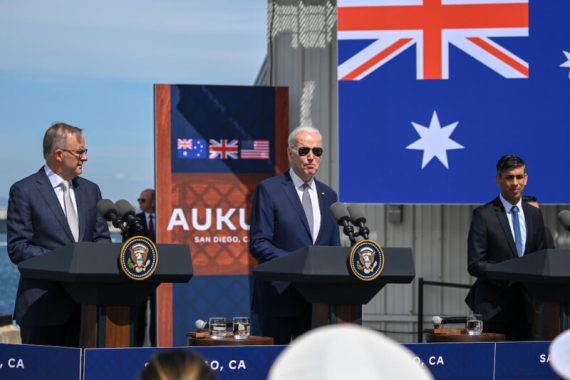O
n March 13, 2023, U.S. president Joe Biden, British prime minister Rishi Sunak, and Australian prime minister Anthony Albanese made a joint statement in San Diego indicating that Australia will acquire nuclear-powered submarines (SSNs) as part of AUKUS.
The SSNs will be powered by highly enriched uranium (HEU), which can also be used in nuclear weapons, will use the UK’s latest design, and incorporate technology from all three partner nations. SSN-AUKUS will be equipped with intelligence, surveillance, undersea warfare, and strike missions.
According to Australian PM Albanese, the deal is expected to cost between $268 billion and $368 billion, making it the largest investment ever made for Australia’s defense capabilities. While concerns about potential atomic proliferation have been raised, Australian officials have emphasized that the country has no intention of acquiring nuclear weapons or developing a civil nuclear capability.
SSNs to counter China’s growing assertiveness
On March 14, 2023, the Chinese Mission to the United Nations criticized the AUKUS nuclear submarine cooperation deal in a series of tweets, noting that it poses serious nuclear proliferation risks and undermines international non-proliferation efforts.
The tweets criticized the double standards of nuclear-armed states transferring enriched uranium to a non-nuclear-weapon state.
The deal has sparked criticism from China, which has denounced it as a “dangerous move” that threatens regional peace and stability. China has urged the UK, U.S., and Australia to address the international community’s concerns and fulfill their obligations in regards to the Treaty on the Non-Proliferation of Nuclear Weapons (NPT). The U.S. has defended the AUKUS submarine deal as a necessary response to China’s “coercive behavior” and “unilateral attempts to alter the status quo” in the region.
China and Australia
The agreement has also impacted trade relations between Australia and China. The relationship between the two nations had deteriorated even before the deal’s announcement due to human rights, security, and trade issues. Notably, China is Australia’s largest trading partner, and it views the submarine deal as a hostile move threatening its interests and sovereignty in the region.
The deal was seen to help Australia acquire nuclear-powered submarines to counter China’s growing military modernization and assertiveness in the South China Sea and Taiwan Strait. It is also seen to challenge China’s Belt and Road Initiative, which seeks to create a global network of trade routes and infrastructure projects to give Beijing leverage over many countries in Asia, Africa, Europe, and Latin America.
Australia, the NPT, and the IAEA
Based on the provisions of the 1968 Nuclear Non-Proliferation Treaty (NPT), it is allowed to transfer fissile material and nuclear technology from a nuclear-weapon state to a non-nuclear- weapon state for peaceful purposes.
However, some critics argue that the provisions were not designed to cover naval nuclear propulsion, and the agreement could undermine the credibility and effectiveness of the NPT.
Recommended
According to reports by the Australian government, Australia is committed to upholding non-proliferation standards as it continues to develop its defense capabilities. The document outlines Australia’s history in the international nuclear non-proliferation regime, including its commitment not to acquire nuclear weapons, its advocacy for nuclear-weapon-free zones, and its support for the Comprehensive Nuclear Test Ban Treaty.
The document also highlights Australia’s two safeguard agreements with the International Atomic Energy Agency (IAEA), which underpin the country’s outstanding non-proliferation credentials. By adhering to international law and agreements, Australia is working to ensure its defense capabilities.
Details of the AUKUS deal
The AUKUS agreement consists of four phases, beginning in 2023 when Australian navy personnel will embed with the navy personnel of the U.S. and UK and their submarine industrial bases. Australia will receive three SSNs from the U.S. in the early 2030s, while the UK is set to begin construction of its first SSN-AUKUS in the late 2020s to be delivered in the late 2030s. Australia plans to start building its first SSN-AUKUS by the end of the 2020s, with delivery expected in the early 2040s.
AUKUS is considered a significant development in the Indo-Pacific region as it aims to counter China’s growing military assertiveness. According to James Hackett, the AUKUS submarine deal has sent shockwaves through the international community since its announcement in 2021. With China’s naval presence in the world seas, the AUKUS partnership is perceived as a step towards balancing the naval power dynamics in the Indo-Pacific region.





